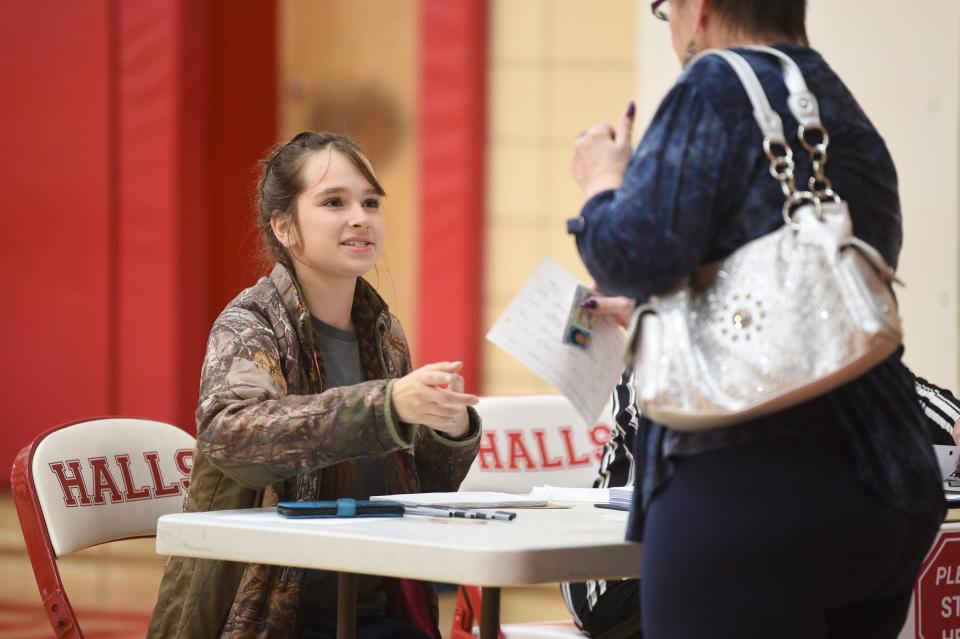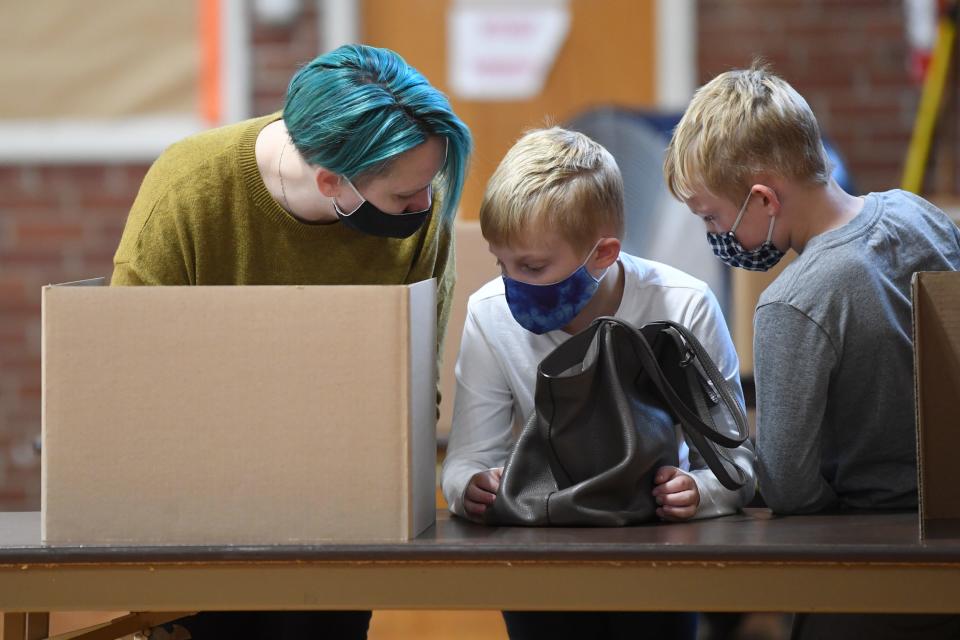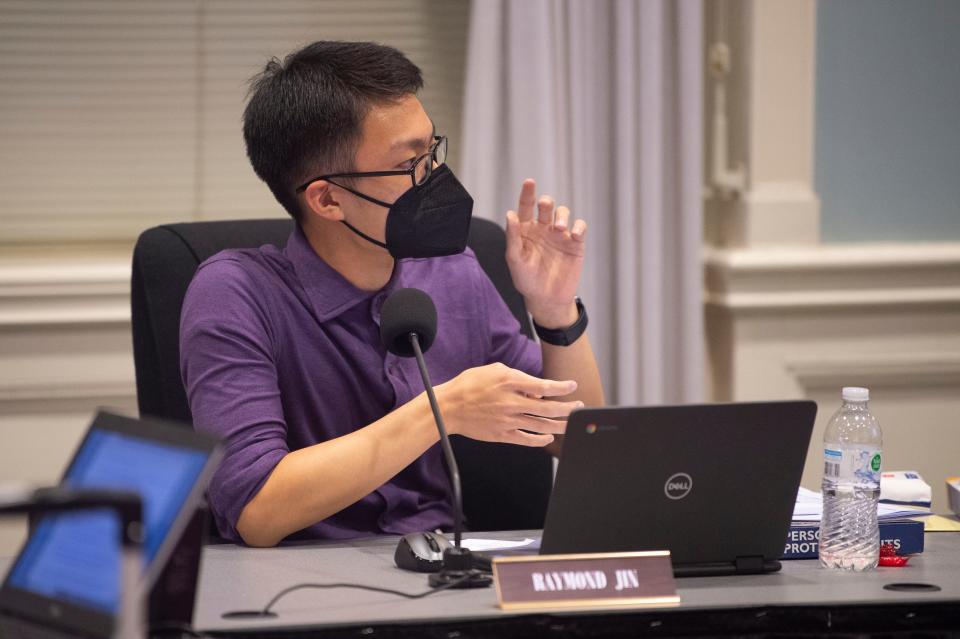Some cities allow teens to vote in local elections, and it's making a difference. Here's how
When you break it down, each member of the nine-person Knox County Board of Education represents about 6,500 students from the district's K-12 schools.
But only about 7 of every 100 students can actually vote for those representatives.
This gives the student body of Knox County far less voting power than adults. Though they can advocate for themselves, they can't vote if they don't like how their representative is handling their education.
Some communities have worked to change that balance. There's a movement to lower the voting age to 16 in local elections and, yes, it's legal.
"They always feel so left out. And maybe that's by design," Rep. Vincent Dixie, D-Nashville, told Knox News. He's part of a group pushing for better election involvement from teens.

Oakland, California, is the biggest city to allow younger voters to cast a ballot in school board elections, and this November will be its first test run.
Knox County primary election results: The vote totals are in
KPD: Paul Noel introduced as new Knoxville Chief of Police
Maryland is a national hotspot for allowing teens to vote, and the data coming out of its elections is promising, said Alberto Medina, communications lead for Tufts’ Center for Information & Research on Civic Learning and Engagement.
In Takoma Park, Maryland, 16- and 17-year-olds outnumbered adults in the first election they could vote in.
Forty-two percent of registered 16- and 17-year-olds voted in local elections that year, which was much higher than the rate among registered adult voters at 10.2%.
Even a small expansion of the electorate can have a big impact locally. There are five school board races in Knox County's election cycle this year.
The Democratic primary in District 1 was decided by a margin of 161 votes, according to records of the Knox County Election Commission. The Republican primary in District 9 was decided by 700 votes.
Raymond Jin, a senior at Farragut High School, is the student representative to the Knox County Board of Education, who gets to speak about issues but can't vote like full members. He supports the idea of lowering the voting age in local elections, saying it would encourage candidates to give more weight to students' concerns.
“Even if it's not a very big share becoming a voting population, these representatives might want to at least engage to get their votes,” Jin said.
If candidates pitch themselves more to students because they can vote, students will in turn become more informed, Jin said.
“Because they can actually vote, they will become more engaged," he said.
Criticisms of lowered voting age
Critics say teens don't have enough political knowledge to make informed decisions. But that argument flies in the face of one of the central tenets of democracy — voting is a right guaranteed to everyone regardless of experience, intelligence or merit.
“For good reason, we don't really attend to the political knowledge of voters. That's not how we decide whether someone should have access to enfranchisement,” Medina said.
Studies show the youngest voters have the same level of political knowledge as slightly older folks, Medina said.
“The idea that a 16-year-old is significantly more politically ignorant, to use that phrase, than an 18-year-old doesn't really hold up to scrutiny,” Medina said.
Most Americans can’t pass a basic civics exam, so holding students to a higher standard than adults have is hypocritical, too, advocates argue.
Others worry about the maturity of young voters.
“We definitely cannot say that here in Tennessee where we just passed the bill for an 18-year-old to be able to carry a gun,” Dixie said.
Choosing who to vote for is a slow decision that happens over time and is based on accumulated information, a kind of decision teens already make. It’s rushed, emotional decisions in the heat of the moment in which teens aren’t as proficient as adults.
“It's not the parts of the brain that have to do with the kinds of thinking and decision-making that goes into being able to vote or make a political decision,” Medina said about brain development.
16-year-olds can drive, work, pay taxes, be tried and sentenced as adults and, in some states, get married with parental consent.
So the debate is complicated: “Either you decide what young people can or can't do across the board, or you're just sort of picking and choosing,” Medina said.
Benefits of voting at 16
Lowering the voting age can create a better picture of democracy by instilling values early on.
“Voting is habitual, and this is something that scholars have known for a while,” Medina said. “People who continue to have a higher voter turnout rate start voting at a young age.”
People are more likely to be habitual voters if their parents take them to the polls as children, if they vote for the first time while living with their parents and if they are in school when they become eligible to vote.

“If you allow 16-year-olds to vote, and they choose not to vote at 16, at least you get them involved so that when they are 18, 20, 22 or whatever, they're more likely to vote because they know what's going on,” Jin said.
Local elections are the perfect place to develop that two-way street. Not only are school boards relevant to high school students, but they're also publicly accessible, making them a great place for hands-on civics education.
Dave Ramsey: Opening a new business? Be ready for the highest highs and lowest lows
And, the school board has authority over course offerings. A civics or humanities teacher might be the person who gets a student invested.
“Schools have a huge role to play ... because they’re one of the few institutions that reaches all or most young people,” Medina said. “It’s important for equity because privileged youth may have other kinds of avenues or opportunities to participate in, but for some, school really is the place where they can acquire a lot of knowledge."
Other movements aim to increase turnout
Educating eligible student voters is a big piece, too. Students say they learn how government works at a high level but miss out on practical information like how to register and vote when they're 18.
“The laws that we put in place really impact the youth more than they do our seniors in life. So why would they not want to have a voice in what's going to happen to them?” Dixie said.
He sponsored the Tennessee Student Voter Act, which would to require high schools to instruct eligible students on how to vote.
Even though his bill failed, it highlighted a need for greater civics education in Tennessee, including education about the power of local governing bodies.

“Kids know that the school board decides when they get a snow day or not. But I don't think they know about the extent to which it decides school policy,” said Matthew Maroney, a Nashville high schooler.
Maroney spearheaded the Student Voter Act. As a senior at Hume-Fogg High School, he says his classmates don't see how government is connected to their world.
Maroney said more humanities classes are needed to teach why civic engagement is important. It gets more voters involved over the long run.
“If there was elevated sense of civic participation among younger students especially, you could see interest in local politics and elections grow quickly,” Maroney said. “And you could see kids get really invested in local school board elections.”
Even if they don't have the same say as voters, students can still advocate for themselves and participate in elections.
Talk to friends and family who can vote and help them make a plan to do so, Medina suggested. Campaign for candidates you favor. Volunteer at the polls. Reach out to your school board member and tell them what matters to you, she suggested.
“Ultimately, (the school board) are serving students and students' opinions do matter, in various situations,” Jin said. “And so they can't just disregard them.”
This article originally appeared on Knoxville News Sentinel: Let teens vote in local elections? Some say the benefits are great

